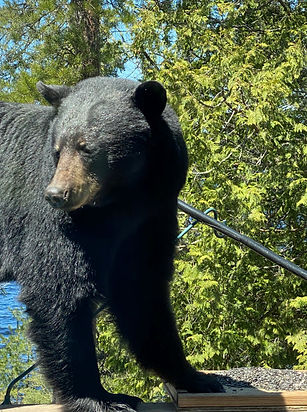BIRD & WILDLIFE FEEDERS AND BLACK BEARS
Bird & Wildlife Feeders and Black Bears

In 2021 it was estimated that 57 million people in the United States enjoy feeding birds. The majority likely have more than one feeder. Unfortunately, animals don’t know that a feeder is only supposed to feed birds.
Many other animals find bird feeders too tempting to pass up. Perhaps bird feeders should be called wildlife feeders? Even when birds are neat eaters, some of the seed inevitably falls to the ground where it feeds everything from mice, to squirrels, fox, pine marten and, yes, black bears.


Black bears can smell food from over a mile away. They will smell your bird feeder and find it, if hungry enough. So, what should you do if you don’t want black bears eating from your feeders?
The easiest answer is to not put out feeders during the active bear months. Many do not consider this a great option as enjoying the activities and songs of summer birds is too entertaining. If you are one of those people, what can you do?
One option is to put the feeders out mid-morning and take them back in before dark. Keep in mind, bears are out and about during the day and it is not unusual for them to be looking for a midday snack.


Another option would be to hang your feeders higher than a bear can reach. This would mean coming up with a system to bring feeders down to a height that you can reach to refill and clean the feeders and keeping in mind what great climbers black bears are.
You could hang the feeders high by putting a 3-4 inch diameter pipe into the ground about 2-4 feet and 10 feet above ground, and hang a feeder from the top of the pipe. This would also require a way to remove and re-
hang a feeder after filling and cleaning. In the Ely area, this is not easy, nor feasible in many areas due to the rocky terrain.
There are many ideas out there to try to outsmart a hungry black bear, including adding cayenne pepper to the seed or using motion lights or alarms. These ideas get an A for effort, and if they work for you that’s great! However, black bears love novel scents and may or may not be deterred by something like cayenne pepper. Alarms may work, but they likely won’t put you on the good list with your neighbors!
If you choose to feed birds (wildlife) during the summer, it’s quite important to keep the seed on the ground cleaned up. Birds are messy by nature and everything that falls on the ground will be appreciated by many other animals.
Other options may be to attract birds by using a bird bath, bird houses, planting flowers that birds enjoy, instead of using food.
So, what is the answer if you want to feed birds? While there may not be an answer that is 100% fail proof, the most consistently effective method for protecting your bird feeders is quite shocking! It’s actually an electric fence. It won’t hurt the black bear, the birds, other animals who may come in contact, nor a human who forgets it is there (although it may be a memorable experience).
The fence can be as elaborate or simple as you wish. The concept is simple (please see information on installing electric fence here). Electric fences are also a good option to keep wildlife out of a garden, or around garbage cans.
While it can be frustrating trying to keep wildlife out of places we don’t want them, it’s important to remember that we have moved into their territory, not the other way around. Since we are guests in their home, we need to learn to live with them. Animals such as black bears can be very entertaining to watch. Learning to protect what is important to us without harming wildlife around us is an important lesson for us all to achieve. If you would like an assessment of your yard or suggestions on how to live peacefully with black bears, please contact us.
